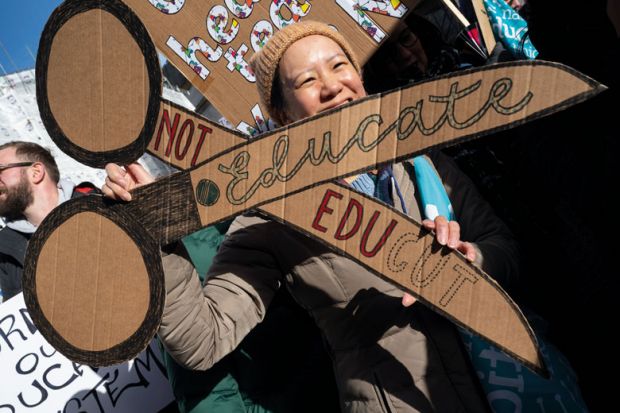UK universities look set for a long summer of disruption, with talks over industrial action “at a standstill” despite some institutions breaking ranks to urge all sides back to the negotiating table.
Strikes affecting exam boards and open days have now been called at 21 institutions, adding to the disruption already being caused by the marking boycott that has derailed many students’ plans for graduation.
The Universities and Colleges Employers Association (Ucea) has said there is “no possibility” of further pay talks despite the University and College Union (UCU) urging it to go higher than the 5 to 8 per cent rise already partially implemented. Ucea has said it is prepared to negotiate on working conditions, but not until the marking boycott is called off, something the UCU said would not happen until a revised offer is presented.
Roger Seifert, emeritus professor of industrial relations at the University of Wolverhampton, said things had hit “rock bottom in terms of staff relations with their employers”, with the dispute “stuck” and both sides “fighting each other to a standstill”.
Queen’s University Belfast has been one of the few institutions to announce publicly the result of the disruption. It stated last week that one in five of its students will not receive their degrees as planned.
Sean O’Connell, president of the university’s UCU branch, said that as Northern Ireland’s exam timetable runs slightly ahead of most other UK-based institutions, the announcement was a sign of what was about to “hit the fan” elsewhere.
Students who had been told that the impact would be minimal were now holding angry protests calling for negotiations to restart, he said.
Queen’s vice-chancellor Ian Greer last month penned a letter to Ucea echoing such demands, writing that “we must find a way forward that allows colleagues on both sides to step back from the current boycott, make compromises and reach an agreement which is fair and sustainable”.
Professor O’Connell said progress required other leaders to “stand up and do the same”, rather than “toeing the party line”.
Shari Krishnaratne, chair of the London School of Hygiene and Tropical Medicine UCU – another institution that has lobbied Ucea to rejoin talks – said she hoped there would be a “domino effect” from such statements because a “critical mass” was needed to resolve the impasse.
But Michael Abberton, chair of the University of Cambridge UCU, whose institution was the first to speak out in late May, said he had been disappointed that so few others had followed.
He said he continued to see the “fundamental issue” in the dispute as being about pay. “If members are forced into accepting yet another real-terms pay cut on top of all the previous years’ real-terms pay cuts, this is going to accelerate into a situation where the whole sector becomes untenable,” he warned.
Last week Cambridge said that half of its finalists were likely to be affected by the boycott, but the institution is likely to be hit harder than most because staff rejected the introduction of emergency assessment measures.
Ucea has said that UCU members have been “misled” into thinking that the marking boycott could lead to a revised pay offer as these talks were completed in February.
“But while change to the pay uplift is simply not an option, Ucea has been at the table waiting for UCU to join to progress the important pay-related issues,” said Raj Jethwa, Ucea’s chief executive.
Both sides have agreed to look at issues including reform of the pay spine, workload, contract types and reducing disability, ethnicity and gender pay gaps, and Ucea said it “wants to progress this important work”.
Register to continue
Why register?
- Registration is free and only takes a moment
- Once registered, you can read 3 articles a month
- Sign up for our newsletter
Subscribe
Or subscribe for unlimited access to:
- Unlimited access to news, views, insights & reviews
- Digital editions
- Digital access to THE’s university and college rankings analysis
Already registered or a current subscriber? Login








